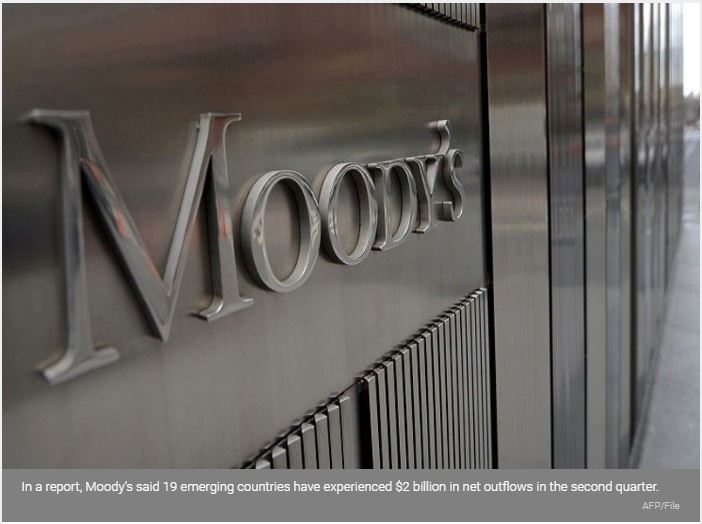Philippines remains at risk from capital outflows — Moody’s
MANILA, Philippines — Moody’s Investors Service said emerging markets, including the Philippines, remain inherently vulnerable to the risk of capital outflows associated with tightening global liquidity.
In a report, Moody’s said 19 emerging countries have experienced $2 billion in net outflows in the second quarter.
Data from the Institute of International Finance showed net capital flows to Argentina, Brazil, Chile, China, Colombia, the Czech Republic, Hungary, India, Indonesia, Korea, Mexico, the Philippines, Poland, Russia, South Africa, Thailand, Turkey, and Ukraine plunged to $11 billion in the second quarter from $118 billion in the first quarter.
“Investors’ need for portfolio rebalancing has led to increased exchange market pressure in other countries as well. But the risk of a wider disruptive contagion event engulfing other emerging market countries remains small, given relatively stronger fundamentals,” Moody’s said.
Last May, Moody’s warned repeated bouts of heightened financial market volatility and reversals of capital flows away from emerging market countries are expected amid the reversal of easy global financing conditions.
“Given the mix of weak macroeconomic fundamentals, loose monetary policy and economic dependence on foreign financing, it is not surprising that Argentina and Turkey have been most vulnerable,” Moody’s said.
Moody’s said Turkey’s economic policies in particular have contributed to a worsening of its credit fundamentals, making its economy uniquely vulnerable.
“We expect portfolio flows to emerging market countries to remain volatile as monetary policy accommodation in advanced economies is gradually withdrawn,” Moody’s said.
Overall, Moody’s added emerging markets remain inherently vulnerable to the risk of capital outflows associated with tightening global liquidity, as advanced economy central banks reverse quantitative easing measures.
The debt watcher said escalating trade frictions further add to overall uncertainty brought about by the tightening global liquidity conditions associated with the reversal of monetary policies in major advanced economies after a decade of exceptional easing, as well as the worsening economic disputes, particularly between the US and China on a range of matters including trade policy, industrial policy and investment policy.
Source: https://www.philstar.com/business/2018/08/24/1845216/philippines-remains-risk-capital-outflows-moodys#OrbyieZCTIjEkU4J.99


 English
English




